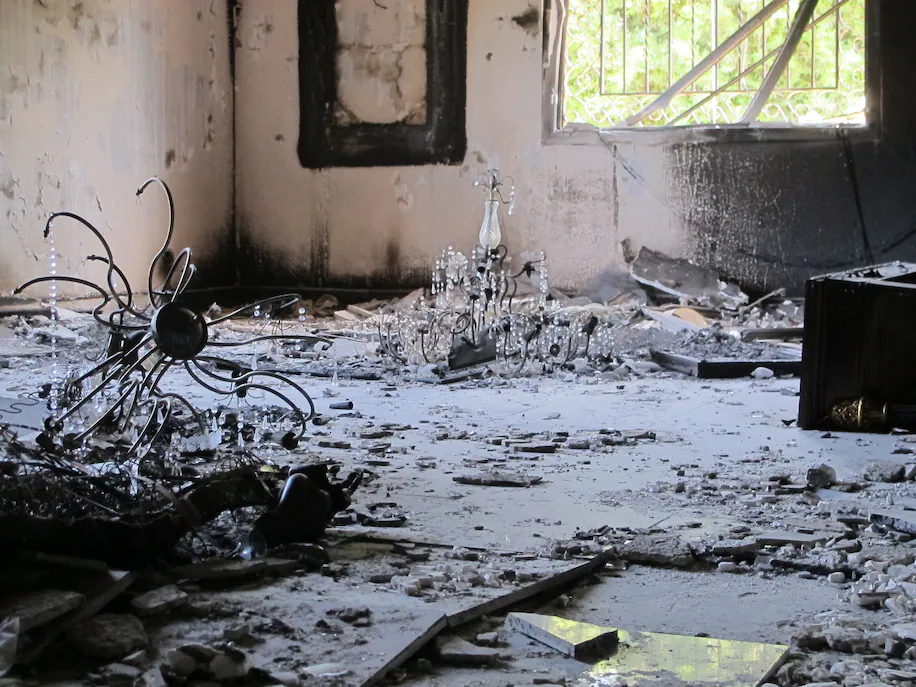The finding from an appeals court was part of Ahmed Abu Khattala’s effort to have his conviction overturned
A Libyan militia leader involved in the deadly 2012 attack on a U.S. compound in Libya was given an “unreasonably low” sentence, and his case must be sent back to a lower court for a new punishment, a federal appeals court ruled Tuesday.
Ahmed Abu Khattala was found guilty in a 2017 trial in D.C. federal court of engaging in terrorism, joining the Benghazi assault armed with a semiautomatic weapon and putting lives in danger through destruction of U.S. property. But jurors were not convinced he had any involvement in the murder of Ambassador J. Christopher Stevens and the three other Americans who died in the attack. He was acquitted on all but four out of 24 charges.
Khattala appealed his convictions, saying the evidence was flawed, the verdict inconsistent and the prosecutor’s closing argument prejudicial. The panel of appellate judges dismissed those claims, instead finding that Khattala — referred to in court filings as Khatallah — was rightly found guilty and that his 22-year prison sentence was “shockingly low and unsupportable.”
The fact that Khattala, 51, was acquitted of the most serious charges against him did not merit such a departure from federal guidelines recommending 30 years to life, the unanimous three-judge panel of the U.S. Court of Appeals for the D.C. Circuit said.
“Those contemplating attacks on the United States, its official properties, and (most importantly) its personnel must know they will face severe consequences if apprehended and convicted,” the court wrote. “Their leaders even more so.”
Khattala, who was captured by U.S. Special Forces in 2014, was the first person convicted in the attacks. A close ally, Mustafa al-Imam, was subsequently convicted of similar charges and sentenced to 19½ years in prison.
The court agreed with Khattala that an assistant U.S. attorney gave a closing argument that was “plainly improper and unbefitting a federal prosecutor” by personalizing the crime as “attacking us” and “ours” while denigrating agreed-upon descriptions of classified evidence as unreliable “words on a piece of paper.” The government called the remarks “a small fraction of a lengthy trial,” without arguing their propriety.
“We expect better from an attorney representing the United States,” the appellate court said. But the judges said that the “misconduct” did not merit a new trial given that “on the charges for which he was convicted, the case against Khatallah was not close.”
Khattala was filmed entering a building on the U.S. compound, armed with an AK-47 rifle just before midnight on Sept. 11, 2012 — about two hours after the initial assault and half an hour before militants gained entry to the adjacent CIA facility. When he exited, he was seen gesturing for others to follow him. Armed men linked to Khattala and his militia were seen pouring gasoline, setting fires and entering buildings on the mission grounds. Phone records show he was in touch with some of them before, during and after the attack. He admitted to the FBI that he was on the scene after the breach.
When he sentenced Khattala in 2018, Judge Christopher R. Cooper said he was “somewhat reluctantly” concluding that the militant was found guilty of “essentially a property crime.” Jurors, he said, had rejected evidence that Khattala was involved in either the fire at the mission’s main residential facility, where Stevens and State Department Foreign Service officer Sean Smith died of smoke inhalation, or the later attack on an adjacent CIA facility where security officers Tyrone Woods and Glen Doherty were killed by mortar fire.
Three Libyan witnesses testified that Khattala’s role was more extensive, including stockpiling weapons, mortar rounds and a shoulder-launched missile, and seeking armored vehicles in advance of an attack he intended to result in American deaths. But a juror said in an interview with The Washington Post after the trial that this testimony was undermined by the cooperators’ antipathy toward Khattala and millions in payment from the United States for their help.
To consider conduct on which Khattala was acquitted, Cooper found, would tell the jurors “that I really didn’t mean what I told them about the importance and the sanctity of jury service.”
The appeals court said that while Cooper “retains the discretion to vary upward or downward” from sentencing guidelines, including “to discount acquitted conduct,” the judge “abused [his] discretion” by “imposing a sentence both lower than the minimum that would be appropriate in light of the jury’s acquittals and far lower than could be justified on this record.”

